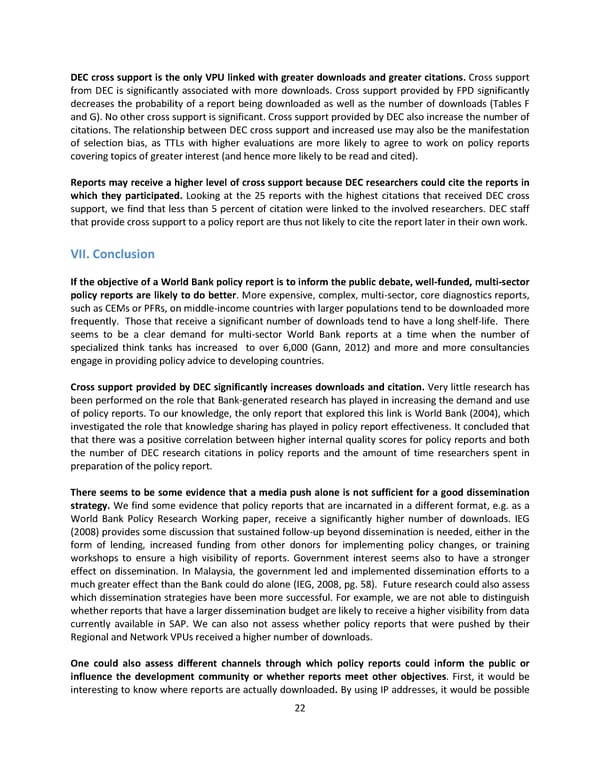DEC cross support is the only VPU linked with greater downloads and greater citations. Cross support from DEC is significantly associated with more downloads. Cross support provided by FPD significantly decreases the probability of a report being downloaded as well as the number of downloads (Tables F and G). No other cross support is significant. Cross support provided by DEC also increase the number of citations. The relationship between DEC cross support and increased use may also be the manifestation of selection bias, as TTLs with higher evaluations are more likely to agree to work on policy reports covering topics of greater interest (and hence more likely to be read and cited). Reports may receive a higher level of cross support because DEC researchers could cite the reports in which they participated. Looking at the 25 reports with the highest citations that received DEC cross support, we find that less than 5 percent of citation were linked to the involved researchers. DEC staff that provide cross support to a policy report are thus not likely to cite the report later in their own work. VII. Conclusion If the objective of a World Bank policy report is to inform the public debate, well-funded, multi-sector policy reports are likely to do better. More expensive, complex, multi-sector, core diagnostics reports, such as CEMs or PFRs, on middle-income countries with larger populations tend to be downloaded more frequently. Those that receive a significant number of downloads tend to have a long shelf-life. There seems to be a clear demand for multi-sector World Bank reports at a time when the number of specialized think tanks has increased to over 6,000 (Gann, 2012) and more and more consultancies engage in providing policy advice to developing countries. Cross support provided by DEC significantly increases downloads and citation. Very little research has been performed on the role that Bank-generated research has played in increasing the demand and use of policy reports. To our knowledge, the only report that explored this link is World Bank (2004), which investigated the role that knowledge sharing has played in policy report effectiveness. It concluded that that there was a positive correlation between higher internal quality scores for policy reports and both the number of DEC research citations in policy reports and the amount of time researchers spent in preparation of the policy report. There seems to be some evidence that a media push alone is not sufficient for a good dissemination strategy. We find some evidence that policy reports that are incarnated in a different format, e.g. as a World Bank Policy Research Working paper, receive a significantly higher number of downloads. IEG (2008) provides some discussion that sustained follow-up beyond dissemination is needed, either in the form of lending, increased funding from other donors for implementing policy changes, or training workshops to ensure a high visibility of reports. Government interest seems also to have a stronger effect on dissemination. In Malaysia, the government led and implemented dissemination efforts to a much greater effect than the Bank could do alone (IEG, 2008, pg. 58). Future research could also assess which dissemination strategies have been more successful. For example, we are not able to distinguish whether reports that have a larger dissemination budget are likely to receive a higher visibility from data currently available in SAP. We can also not assess whether policy reports that were pushed by their Regional and Network VPUs received a higher number of downloads. One could also assess different channels through which policy reports could inform the public or influence the development community or whether reports meet other objectives. First, it would be interesting to know where reports are actually downloaded. By using IP addresses, it would be possible 22
 Which World Bank Reports Are Widely Read? Page 27 Page 29
Which World Bank Reports Are Widely Read? Page 27 Page 29